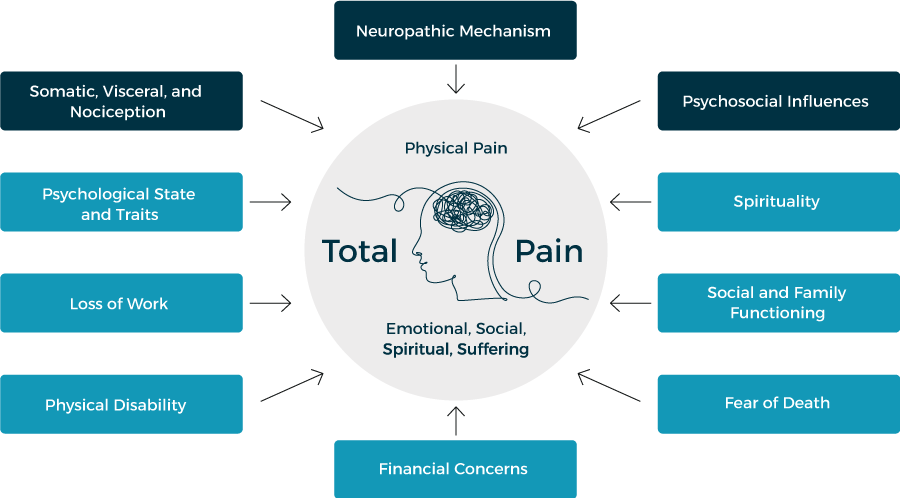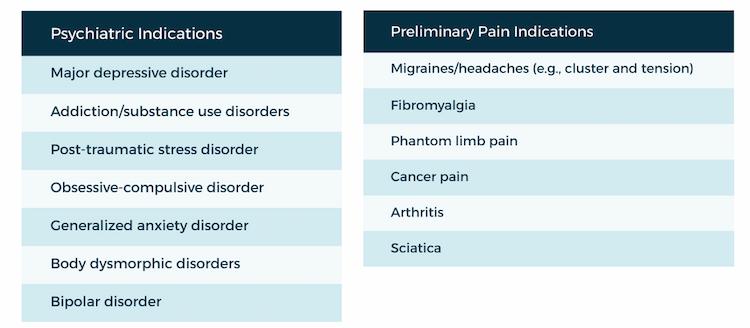
Pivoting your psychedelic compound from psychiatry to chronic pain
By: Christine Moore, PhD, Vice President, Scientific Solutions, Neuroscience
Clinical research is approaching a shift in our treatment of chronic pain management, with growing interest and use of psychedelics over more traditional methods. Though a relatively new arrival to clinical research, we are already realizing the potential transformative power of psychedelic therapeutics. Psychedelic research is ongoing in various psychiatric disorder, including major depressive disorder (MDD), treatment-resistant depression, and post-traumatic stress disorder (PTSD). The exploration of psychedelics as potential alternatives to conventional pain treatments has also recently gained interest, perhaps from the promising and lasting results seen in psychiatric indications. If you are already investigating a psychedelic, it may be worthwhile to consider additional trials for chronic pain. Let us help you make the transition.
Psychedelics Increase Pain Coping Skills
Psychedelics are hypothesized to alter the brain’s default mode network and increase plasticity, but they may also modulate the psychological constructs that affect pain perception and the inflammatory response. Such a transformative nature of treatment, whereby a single dose has lasting effects far beyond substance metabolism and excretion, implies neuroplastic changes occur within the brain during the psychedelic experience, particularly for processing negative emotions, as we have seen in psychiatry. Enhancing the ability to cope with the distress of pain in addition to modulating pain itself would be a significant advantage over traditional pain management strategies, which often require continuous dosing and carry a high risk of side effects, dependency, and overdose. This can be clearly seen in the ongoing opioid crisis, which has created a substantial global burden, with approximately 60 million individuals using opioids. Some place the annual death toll at 100,000 people. Considering the complex nature of chronic pain, there is an urgent and unmet need to develop alternative lower-risk treatments promoting safer clinical outcomes.

Current Indications Use Case
While most psychedelic studies to date have been within psychiatry indications spanning a multitude of conditions, as seen below, studies in chronic pain and pain management have begun to emerge, highlighting the growing trend to explore potential psychedelic efficacy. Preliminary studies in chronic pain indications and associated data suggest a promising potential for long-term therapeutic efficacy without the risk of overdose that current treatments present. The increased interest in psychedelics is likely to continue growing, making now the perfect time to become a part of this work.

Pivot Your Psychedelic Compound to Chronic Pain; Get Ahead of the Rest
As the body of research grows, psychedelics are becoming increasingly recognized as a safer promising alternative for both psychiatric and chronic pain management. With the proper clinical designs and regulatory strategies, these compounds could revolutionize how we approach pain, shifting from a purely symptom-management model to a holistic and transformative one.
Our teams can help you explore the therapeutic potential of your psychedelic within pain populations. As one of the first CROs to partner with the innovative sponsors exploring the clinical development of psychedelics, we’ve emerged as an industry leader known for providing rigorous clinical development services. Our teams have worked on more than 22 psychedelic trials globally and are versed in the complexities required to operationalize these trials while ensuring patient safety, meeting regulatory expectations, complying with licensing, and navigating the complex supply chain logistics. We also have experience in consulting, having provided support to around 12 sponsors on regulatory interactions, including pre-IND meeting support, clinical development planning, protocol development, and achieving breakthrough therapy designation.
With access to DEA-licensed sites and expertise in rater and session monitor training and support, we can facilitate the efficient delivery of your trial and ensure it is at the forefront of the transition of psychedelics into therapeutic protocols for chronic pain.
For more information on how to set up and run your psychedelic analgesia study, be sure to check out our white paper, The Art and the Science of Analgesia Research with Psychedelic Agents, where we discuss transferrable concepts from psychedelics in psychiatry, such as:
- The importance of site selection, including the sites’ physical size needs compared to standard pain studies and nuanced differences in treatment room layout for participants.
- The unique regulatory aspects, such as DEA licensure, associated with trials that use Schedule I compounds and how they impact study design and timelines.
- Considerations for differences from a standard chronic pain study, such as additional staffing needs to address the more complex study design, unique site education suggestions, and additional factors.
Psychedelics and chronic pain research are rapidly gaining support. Get ahead and contact us today to pivot your psychedelic compound for use in an analgesia study!